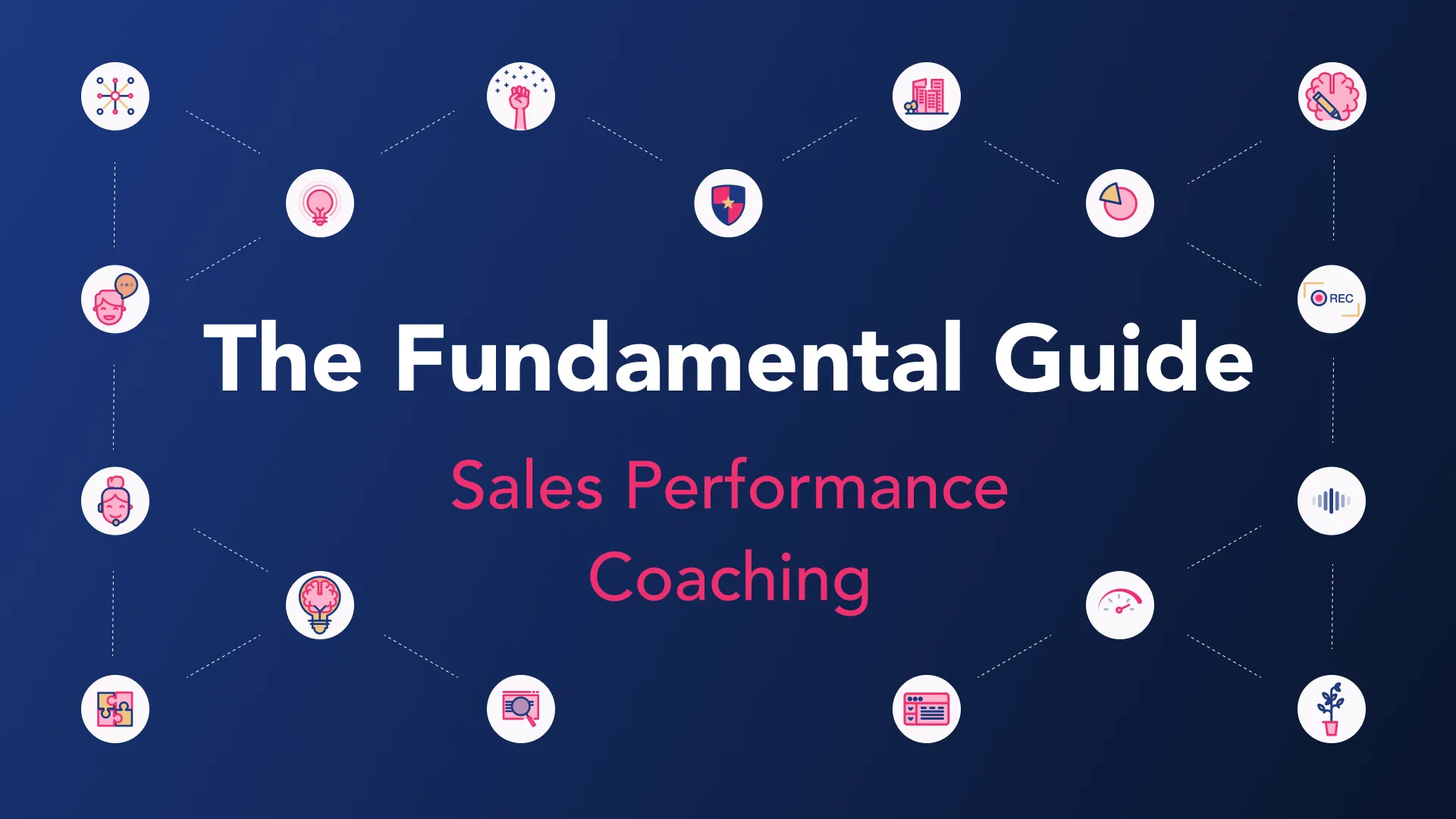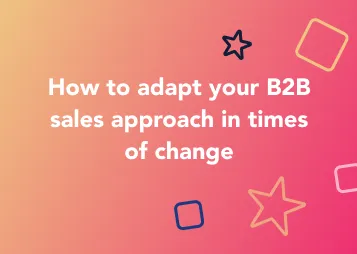60-Second Summary
Here's we'll explain how Sales Leaders can coach reps to improve win rates, shorten the sales cycle, and increase average deal size. We'll compare sales coaching vs. training, outlines self-coaching, peer coaching, and manager-led coaching, and show how to build a sales coaching plan with onboarding, milestones, and checkpoints. You’ll learn best practices: use conversation intelligence and call recording, review real calls, mix formats (1:1s, group, role-plays), encourage self-evaluation, and tailor coaching to individual drivers. We'll explore key coaching areas (prospecting, objection handling, presentation, closing, relationship building, time management) and the KPIs that prove coaching effectiveness: conversion rate, deal size, cycle length, customer satisfaction, engagement/retention. We'll also highlights how coaching improves forecast accuracy, frees Sales Managers to lead strategically, and supports career progression. Tools like Salesforce, HubSpot, and CI platforms operationalize coaching with data-driven feedback. Use this playbook to create consistent, personalized coaching that scales performance and revenue.
---
What is sales coaching?
Sales team coaching is a structured, ongoing process where sales managers give personalized guidance to help reps improve their skills, self-diagnose challenges, and close more deals. It works best through frequent one-on-one conversations that focus on listening, asking questions, and setting clear development goals with simple action plans. By providing constructive feedback, holding reps accountable, and targeting one improvement area at a time, sales coaching drives consistent performance gains across the team.
Both new and experienced sales professionals can benefit from sales coaching - just like the world's most elite athletes have coaches. While leaders can and do play an important role, coaching can take a variety of formats. Let’s dive in!
What does a sales coach do?
Sales coaches work directly with sales reps, either as a team or individually, to sharpen their skills, elevate performance and help them achieve measurable results. Coaching a sales team often also involves collaborating with sales managers and leaders to refine techniques, improve communication and implement strategies that align with specific objectives.
Sales coaching vs training
Sales coaching and training might sound similar but they actually serve different purposes. Let’s look at each:
- Training focuses on the basics of sales, including equipping teams with processes, tools and techniques in a structured and often standardized format.
- Coaching in sales, on the other hand, is a personalized and ongoing process that focuses on real-world applications, working closely with individuals to identify strengths, address challenges, hone sales skills and ensure their efforts translate into better results.
Your role as a sales coach
A good sales coach plays a crucial role in a high-performing sales team, so, when it comes to coaching your reps, your focus should be on empowering individuals and driving consistent growth. Remember: sales coaching is an ongoing effort to develop skills, build confidence and align your team’s individual strengths with the organization’s goals.
Coaching sales teams requires prioritization. This means assessing your team's performance and learning to identify areas for improvement. Pay the most attention to what will have the greatest impact and tailor your guidance to each person’s unique needs. Offering thoughtful feedback, asking meaningful questions and encouraging accountability are not only part of your role as a sales coach, but are also key in helping your team succeed and adapt in dynamic sales environments.
Benefits of sales coaching
Sales coaching is known to result in benefits for both businesses and individuals. It drives measurable improvements in performance, builds stronger teams and fosters a culture of growth - which can all lead to bigger wins and higher revenue.
Here are some of the main benefits of coaching in sales:
Improved win rates and reduced sales cycles
Organizations that implement regular sales coaching often see improved win rates and reduced sales cycles. In fact, organizations with coaching programs see 28% higher win rates. Pretty compelling, right? Coaching helps identify and address barriers in the sales process, which, down the line, makes reps better equipped to quality leads, handle objections and close more deals, resulting in a stronger overall performance and a boost to the bottom line.
Honing techniques like effective time management, precise targeting of ideal customers and streamlining the decision-making process for buyers helps reduce the sales cycle. Reduced sales cycles mean that deals are closed more quickly, allowing sales teams to focus on new opportunities and maximize productivity.
Saved time and better leadership
One of the biggest sales coaching benefits is that sales leaders who coach have more time to invest in other areas. When we coach our people, we understand them. We learn about their beliefs, values and strengths in their personalities and skills. You can use that wisdom to help team members connect with each other in the most productive ways.
Discover who on your team is most suited to a job's aspects and then delegate accordingly so the team can help each other. Slotting the best person into each role increases and improves overall output without adding more people. When you can connect others to working on their strengths and skills, you, as a leader, can move to a role of support, freeing up your time.
When the leaders have more time, they can be impactful in other ways. To find out more about the connector style of leadership, check out this report by Gartner: Managers Can’t Be Great Coaches All By Themselves
Better forecasting and strategizing
Sales coaching gives you the tools and insights to bridge the gap between what your sales team says and what their numbers reveal. Until you start looking into the granular detail of what your sales team is doing, you cannot accurately predict your sales pipeline.
How do you know how likely a sale is when a rep tells you one thing but their conversion rate tells you another? As you approach the end of the quarter, how do you know which opportunities are worth spending time on with limited people and time resources?
Luckily, you don’t have to sit down and listen back to every single sales call. Using Conversation Intelligence (CI) to automate call recording, scoring and learning, you can gather insights quickly and effectively. Know how and where your team should be spending their time, both in the short and long term.
Unlocked freedom and career progression
Another benefit of sales coaching is the confidence and ownership it develops in our sales team - yourself included. If you’re not coaching your sales reps through their challenges, then you’re problem-solving for them. If you’re solving issues and handing out direction, you’re creating an environment where your team becomes overly reliant on you. It’s then harder to remove yourself from the daily sales operation.
This does not equal success for you, them or the organization as a whole. Instead, when we lead through coaching, that confidence and ownership that builds in your team creates independent thinkers, a team that can now operate when you’re not in the room. That power in your team is incredibly valuable for you, it gives you freedom to explore different opportunities, opportunities that exist in other areas of your business, or maybe additional roles you can take on for other businesses which can really help your career flourish.
Happier sales teams and higher retention
The importance of sales coaching isn’t just about the numbers. Regular sales coaching has been seen to improve employee motivation, autonomy and job satisfaction which reduces employee turnover and absenteeism. When reps feel supported and see tangible growth in their skills, they’re more engaged and committed to their work. This, in turn, translates into a sense of ownership and confidence, which gives team members the tools they need to succeed while showing that their growth and development matter.
A happier, more motivated team not only performs better but also contributes to a positive and collaborative company culture. Higher retention rates reduce the costs associated with recruiting, hiring and onboarding new sales reps - which yes, means you don’t have to put a new person through your sales coaching program.

Common sales coaching models
If you're looking to improve sales coaching in your team, it's important to recognize the three distinct formats of sales performance coaching: self-coaching, peer coaching and manager-led coaching.
Conversation intelligence (CI) has an important role in all three types. It provides a platform for transcribing and analyzing sales calls, highlighting data on what has gone well and what hasn’t at specific points in the calls. This helps pinpoint areas that need coaching, and you can leave comments and qualitative remarks to learn from.
Let’s look at each of these sales coaching types in more detail:
Self-coaching
Self-coaching involves team members listening to their own call recordings, identifying and reflecting on their areas for improvement and creating an improvement plan.
The key to self-coaching is to approach it objectively, with an open mind and balance. Individual sales reps who spend just 3-4 hours per month listening back to sales calls tend to improve their win rate by 5.5%, so self-coaching alone is a great coaching technique to start with.
How to start doing sales self-coaching
Step 1: Record and review
Use sales call recording tools like Jiminny to capture sales interactions, including phone and video calls, in-person meetings and emails.
Step 2: Objective analysis
Listen to recorded sales interactions with an objective mindset. Pay attention to tone, language, rapport-building techniques and adherence to sales methodologies.
Step 3: Identify areas for improvement
Reflect on performance and pinpoint specific areas where you can enhance your skills or strategies. If you can use a framework to benchmark against, that will give you the perfect objective measure, or your conversation intelligence platform can do this for you. This could include things like refining objection-handling techniques, improving active listening skills, or mastering product knowledge.
Step 4: Set SMART goals:
Based on your analysis, set Specific, Measurable, Achievable, Relevant and Time-bound (SMART) goals for improvement. For example, aim to increase your conversion rate by 10% within the next quarter.
Step 5: Practice and implement:
Actively practice new techniques or approaches identified during your self-coaching sessions. Incorporate feedback from previous interactions into your sales strategy to continuously refine your approach.
Step 6: Regular review
Schedule regular self-coaching sessions to track your progress towards your goals using your conversation intelligence tool. Celebrate successes and adjust your strategies as needed to stay on track toward sales excellence.
Peer coaching
This type of sales coaching involves gathering your team to discuss sales calls and highlight areas for improvement. It’s a collaborative effort, done in the spirit of helping each other.
There are many ways to go about this. Some teams will share call recordings with each other for review, while in others, individual reps will share specific points in a call and ask peers for feedback.
How to start peer-to-peer coaching for sales
Step 1: Establish trust and respect
Create a supportive environment where team members feel comfortable providing and receiving feedback. Emphasize the value of constructive criticism and mutual growth.
Step 2: Share call recordings
Exchange call recordings with peers for review and feedback - and don't just pick your best calls! Encourage open dialogue and constructive critique to identify areas for improvement.
Step 3: Provide specific feedback
Conversation intelligence tools often have features that allow you to leave coaching feedback directly in a call recording at a specific time, which will help make your feedback as relevant as possible. When providing feedback to peers, be specific and actionable. Focus on strengths and areas for growth, offering concrete suggestions for improvement.
Step 4: Practice active listening
Actively listen to feedback from peers with an open mind, seeking to understand their perspectives and insights. Embrace opportunities to learn from each other's experiences and expertise.
Step 5: Collaborate on solutions
Work together to brainstorm creative solutions to common sales challenges or obstacles. Leverage the collective knowledge and expertise of the team to enhance individual and group performance.
Step 6: Foster accountability
Hold each other accountable for implementing feedback and executing action plans. Encourage regular check-ins and support each other in achieving shared goals for sales success.
Manager-led coaching
Manager-led coaching is often a one-to-one or small group session between a leader and their team members.
The coaching is interactive, with both the leader and individuals reviewing what went well and what needs improvement and should focus on a limited number of topics or criteria.
How to start coaching as a manager
Step 1: Establish clear expectations
Clearly communicate performance expectations and goals to your team members, outlining key metrics and benchmarks for success.
Step 2: Schedule regular coaching sessions
Schedule one-on-one or small group coaching sessions with each team member to review performance metrics, discuss challenges and set development goals.
Step 3: Provide constructive feedback
Offer timely and specific feedback on both strengths and areas for improvement, focusing on actionable steps for growth. Use data-driven insights and real-life examples to illustrate key points.
Step 4: Tailor coaching approaches
Recognize that each team member may have unique strengths, weaknesses and learning styles. Adapt your coaching approach to meet each sales professional's individual needs and preferences.
Step 5: Empower through development
Provide opportunities for skill development and training, whether through formal workshops, peer mentorship, or self-directed learning initiatives. Encourage continuous growth and learning within your team.
Step 6: Track progress and celebrate wins
Monitor your team members' progress toward their goals regularly, celebrating achievements and milestones along the way. Recognize and reward exceptional performance to reinforce positive behaviors and outcomes.
How to create a sales coaching plan
A whopping 75% of sales organizations end up wasting resources with inconsistent and informal coaching. Creating a structured sales team coaching plan will help you stay focused, set clear expectations and have a framework you and your team can build on now and in the future.
Be sure to include the following elements in your sales coaching plan:
- Onboarding plan: Detail the resources, tools and knowledge that new sales professionals will need to succeed from day one. This can include introductions to team members, an outline of the training schedule and details on processes they’ll use regularly.
- Performance milestones: Define what you expect from your sales team in terms of measurable goals and break them into short- and long-term targets, such as monthly and quarterly objectives, to keep progress on track.
- Progress checkpoints: Set regular times to meet with reps, review their progress and adjust goals or strategies as needed. This will help keep everyone aligned and focused on improvement.
Sales coaching best practices
Ready to coach sales teams that get results? While there isn’t a one-size-fits-all solution for coaching for sales performance, there are some tried-and-true practices that can make your sales coaching efforts more effective and impactful:
Use conversation data
Leverage insights from conversation intelligence tools to pinpoint trends, strengths and areas for improvement. Conversation data can give you a clear starting point for your coaching sessions and sales training activities.
Use call recording software
Reviewing sales call recordings can help you identify exactly where reps can improve, whether that means refining their pitch, handling objections more effectively, or something else.
Build trust with your team
A strong coaching relationship starts with trust, so always show your team that their growth is your priority by being approachable, supportive and transparent.
Mix up your sales coaching styles
If you’ve been sales coaching for a while, you already know that every rep learns differently. So, make sure to accommodate different learning styles and keep things engaging. You can combine things like group sessions, one-on-one meetings and hands-on role plays during your coaching sessions.
Encourage self-evaluation
Sometimes the most motivating sales performance coach is the coachee. Empower your reps to assess their own performance. No matter their level of experience, self-reflection will help them identify areas they want to improve and take ownership of their growth.
Ask for feedback
Coaching isn’t a one-way street, so always be sure to ask your team how you can improve as a coach and adjust your approach and sales coaching techniques based on their input.
Lean on your top reps
Your high performers can set the standard for the rest of the team. Involve them in sharing best practices and mentoring newer reps and managers.
Learn each rep’s drivers
Take the time to understand what motivates each team member and tailor your coaching style accordingly. For some, it could be career growth or recognition, while others may thrive on incentives and structured feedback.
Use incentives
Recognize achievements with meaningful rewards. Incentives can boost motivation and encourage consistent performance across your sales team.
Provide positive feedback
Along the same lines, be sure to celebrate wins and progress - no matter the size. Reinforcing what’s working builds confidence and keeps morale high.
Have hard conversations when you need to
As you already know, managing a sales team isn’t always rosy good times. Things happen in sales and in life, which means that constructive criticism will always be part of the process. Address challenges directly but with empathy to help your reps grow without feeling discouraged.
Stay consistent
Coaching sales reps requires consistency. Regular sales coaching builds trust and helps ensure steady, forward-moving progress. So, even if you’re short on time, try to stick to a schedule and make coaching part of your organizational priorities.
Tips for becoming a great sales coach
Great sales coaching requires connecting with your team, both as individuals and as a group, understanding their needs and guiding them toward success. These sales coaching tips will help you refine your approach and create a positive impact on performance and growth through coaching.
Prioritize your efforts
Unfortunately, you can’t spend your whole working week coaching, so you have to prioritize what and how you coach. Honing in on which areas need the most improvement for each team member will maximize your coaching efforts. Start with a review of where your team is at and what the knowledge gaps are, then align this with the current state of your market. Working out which areas of coaching will have the most impact on your team will amplify the benefits.
Focus on the person, not the player
Sales is about people, so make sure you understand and support the individual growth of each team member. Take the time to know your team on a personal level - their aspirations, their unique strengths and their weaknesses. Tailor your coaching approach to their specific needs, offering personalized guidance that considers their individual learning styles.
Inspire confidence and ownership
Confidence is a key attribute of a successful sales rep. As a sales coach, it's your job to nurture confidence in your team, so allow them the space to take ownership of their sales processes and outcomes. Then it’s up to you to provide constructive feedback and recognize their achievements, highlighting the progress they make along the way. Empower your team members to set their own goals so they hold themselves accountable for achieving them.
The gamechanger: Ask powerful questions
Your team doesn’t need spoon-feeding, so don’t feel like you need to give them all the answers.
Ask open-ended questions to encourage critical thinking and problem-solving. This will encourage your team to think more independently, explore alternative lines of thought and arrive at a conclusion, having learned more along the way. Remember, it’s about the journey.
Each team is unique, so we can’t tell you exactly how to be a good sales coach. Use these best practices and don’t forget: listen to your team and trust your gut.

Key areas to focus your coaching efforts
Sales coaching encompasses a wide range of topics and skills designed to enhance sales effectiveness and performance. To improve sales coaching time, consider coaching sessions focused on the following key areas:
- Prospecting and lead generation: identifying and qualifying leads, leveraging various channels and strategies to fill the sales pipeline.
- Sales communication skills: including active listening, persuasive language and rapport-building strategies.
- Objection handling: addressing common objections and concerns raised by prospects, overcoming resistance and moving the sales process forward.
- Sales presentation skills: creating and communicating compelling presentations and demonstrations that resonate with prospects, highlighting value propositions and addressing customer needs.
- Closing techniques: effectively closing sales opportunities, overcoming objections and securing commitments from prospects.
- Relationship building: nurturing long-term relationships with clients and prospects, fostering trust, loyalty and repeat business.
- Product and industry knowledge: deepening your rep's understanding of products or services offered, as well as industry trends, competitive landscapes and market dynamics.
- Time management and organization: techniques for managing time effectively, prioritizing tasks and optimizing productivity to maximize sales outcomes.
By addressing these topics through targeted coaching sessions, sales professionals can develop a comprehensive skill set and mindset conducive to sustained success in the competitive sales landscape.
How to measure sales coaching effectiveness: 6 key metrics
Measuring whether you have been able to improve sales coaching effectiveness is crucial for assessing its impact on overall sales performance and identifying areas for improvement. Consider tracking the following key metrics:
- Sales conversion rate: Measure the percentage of leads or prospects that convert into paying customers, specific to each rep.
- Average deal size: Track the average value of sales deals closed by individual team members or the entire sales team. Coaching efforts should lead to an increase in average deal size over time.
- Sales cycle length: Monitor the length of time it takes for leads to progress through the sales pipeline from initial contact to closure. Effective coaching can help streamline the sales process, reducing cycle times and accelerating revenue generation.
- Customer satisfaction scores: Gather feedback from customers to gauge their satisfaction with the sales experience. Higher satisfaction scores indicate that sales coaching efforts are translating into positive outcomes for customers.
- Employee engagement and retention: Measure employee engagement levels and turnover rates within the sales team. Effective coaching can contribute to higher levels of job satisfaction, engagement and retention among sales professionals.
By tracking these metrics over time, revenue and sales leaders can evaluate the impact of coaching initiatives, identify areas of strength and weakness and make data-driven decisions to optimize sales coaching efforts.

Top companies that implement regular sales coaching
With the endless list of benefits of sales coaching, it's no surprise many world-renowned companies demonstrate a commitment to regular sales coaching and professional development opportunities:
- Salesforce is a global leader in customer relationship management (CRM) software. It is renowned for its comprehensive sales training programs and ongoing coaching support for sales professionals.
- IBM offers extensive sales enablement resources and training programs to empower its salesforce with the skills and knowledge needed to succeed in today's competitive marketplace.
- HubSpot provides a wealth of sales coaching resources, including online courses, certification programs and coaching sessions tailored to the needs of sales professionals at all levels.
- Amazon prioritizes continuous learning and development for its sales teams, offering comprehensive coaching and mentorship opportunities to support professional growth and performance excellence.
- Microsoft invests heavily in sales coaching and development initiatives, providing its salesforce with access to tailored training programs, coaching sessions and resources to enhance their effectiveness in driving business outcomes.
- Google emphasizes a culture of ongoing learning and development, offering sales coaching programs and resources designed to equip its sales teams with the skills and knowledge needed to excel in a dynamic and competitive market environment.
- Cisco provides comprehensive sales training and coaching programs to enable its salesforce to deliver exceptional customer experiences and drive revenue growth across its diverse portfolio of products and solutions.
- Adobe prioritizes sales coaching and professional development, offering its sales teams access to training programs, coaching sessions and resources designed to enhance their skills, knowledge and effectiveness in driving sales success.
By learning from the best practices and experiences of these top companies, organizations can glean valuable insights into effective sales coaching strategies and approaches, driving continuous improvement and success within their own sales teams.
Unlock your team’s potential with Jiminny
Jiminny’s AI-powered sales coaching platform transforms how your team learns and performs. With features like real-time coaching, automated call scoring and detailed analytics, Jiminny makes it easy for your team to continuously improve, streamline their processes and win more deals.
Discover what Jiminny can do for your team. Explore our conversation intelligence platform or book your free demo today!
Shelley Lavery is the COO and Co-Founder of Jiminny, the leading conversation intelligence and sales coaching platform that helps companies maximize their revenue. With over a decade of experience in coaching B2B sales teams, Shelley was previously Group SVP of Sales at Reward Gateway now leading the conversation intelligence discussion with expertise and insight.





.webp)






